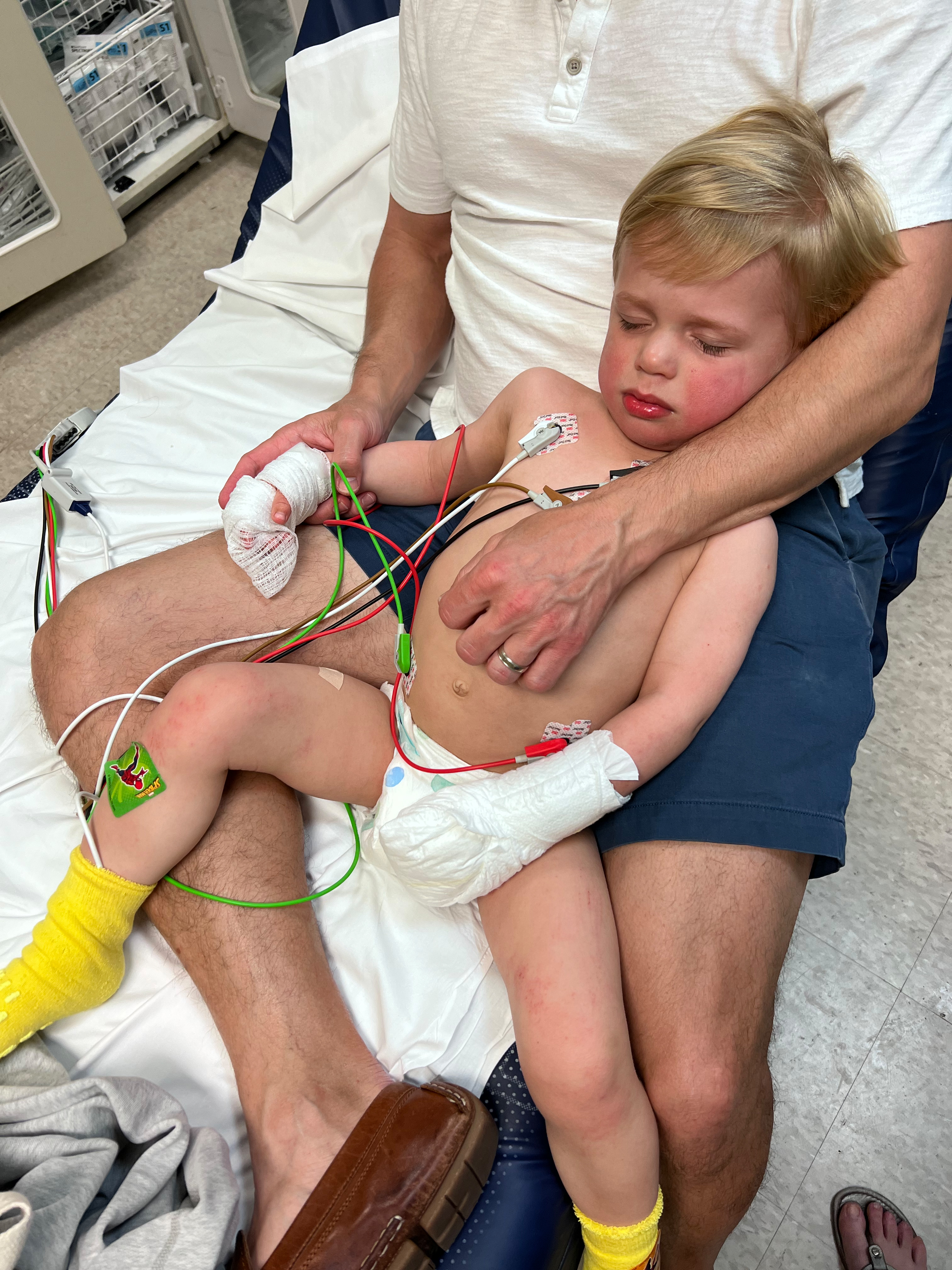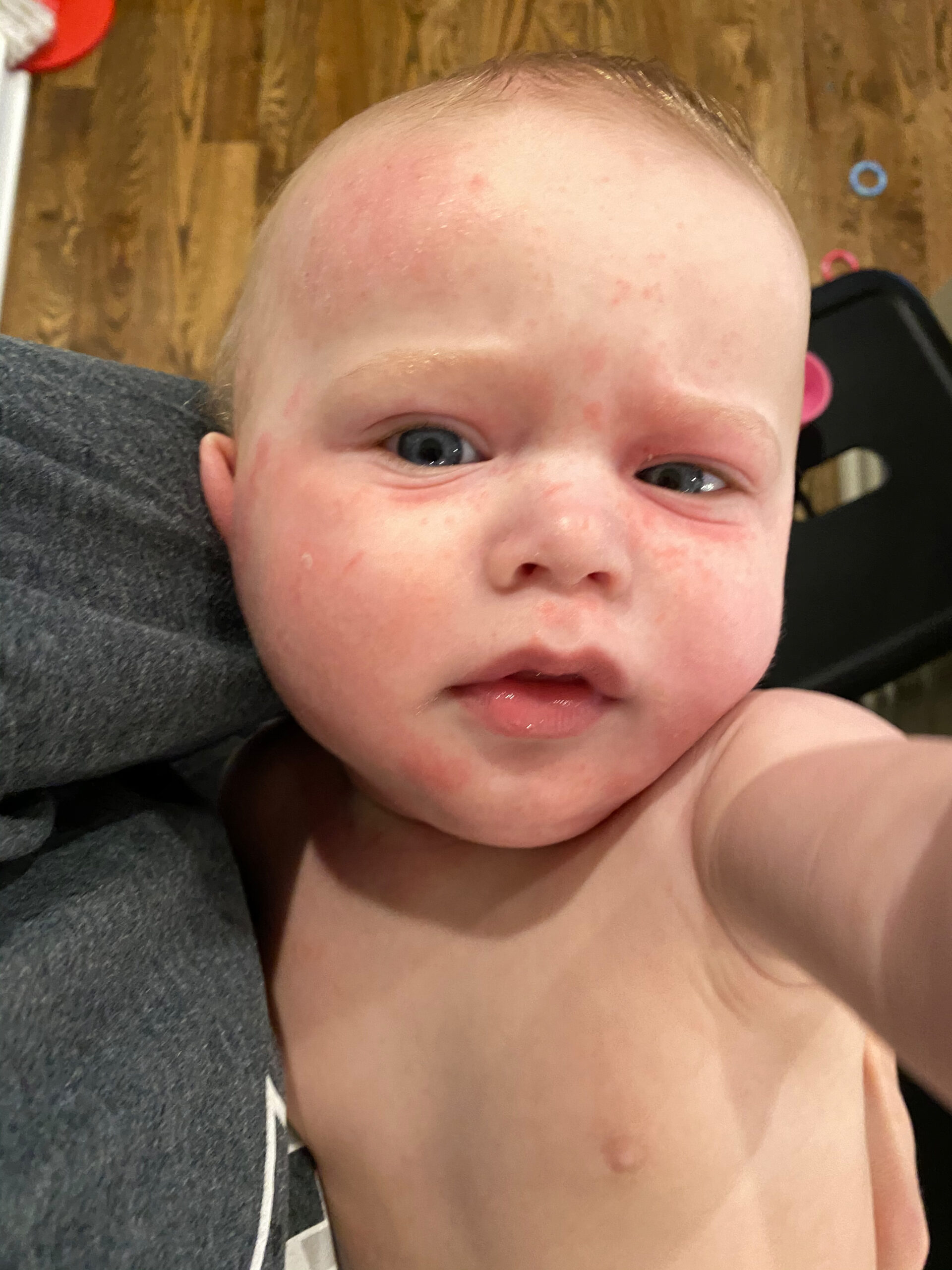We are so honored to introduce our son Riley and share his story! Riley is a fun, smart, loving 3 year old little boy. He loves dinosaurs, cars and playing with his friends at school. Riley also has life threatening food allergies, and has anaphylactic allergens to 12 foods, as well as sensitivities to many others.
At 6 months old when we began to introduce solids, Riley had the first of many reactions to come. After ingesting green beans, a member of the legumes family, he broke out in full body hives and had swelling around his eyes. I suspected immediately that Riley could have a peanut allergy, also a legume, and it was confirmed very soon after with a positive skin test. We were lucky to make it a while longer without a serious reaction, and I honestly lived in denial for much of that time. We thought that peanuts and tree nuts were the extent of his severe allergens, but learned all too soon that Riley was struggling with far more, and it was later confirmed he has severe allergies to peanut, tree nuts, several seeds including sesame and mustard, soy, wheat, lentils and chickpeas among others.
In February of 2021 Riley had his first anaphylactic reaction to a chic-fil-a chicken nugget. Within 15 minutes of ingestion, he began coughing, slowly at first, then without pause. He was red all over his body, hot to the touch and began crying and saying “Owie” pointing at his chest. We rushed to the ER in total panic and fear, where epi and other life saving drugs were administered and he was closely monitored.
Even as an allergy parent, I realize my naivety in hindsight – I expected an anaphylactic reaction to be a lot like the scene of Will Smith in the movie Hitch, but it’s not like that at all, and food anaphylaxis can be very tricky to identify. Food anaphylaxis is when two or more body systems are reacting to ingestion of a particular food protein. Bodies can react to many different proteins, even those beyond the top 9 allergens that are widely recognized.
In September of the same year, he had another reaction, this one quite terrifying although we still to this day don’t know exactly what he ingested. His reaction was so severe, causing his blood pressure to dip to dangerously low levels, that it required multiple rounds of epinephrine and admittance to Greenville memorial.
It’s scary to live in a world where a cracker could take your child’s life. It sounds dramatic – but it’s truly the reality of his diagnosis. A simple bite of food, something that should be so harmless, could have deadly consequences for our beautiful boy. Keeping him safe isn’t as simple as avoiding certain food groups. There is great risk in cross contamination, and even the touch of someone who has recently handled/eaten one of his allergens.
We have learned through our journey with Riley that much of the world is greatly unaware of the seriousness and severity of allergies, including ourselves at the start of our journey. There’s no room for a spontaneous family outing, a meal at a restaurant, or a quick after dinner trip for ice cream. He’s had minor reactions just from simply sitting at a table where one of his allergens was recently served. Riley is left out of a lot of celebrations and outings that revolve around food, and we are constantly on high alert as to what has touched surfaces or what others are eating around us wherever we might be. We have left many parks and playgrounds as wrappers of dangerous food are opened up close by. We don’t leave the house without our emergency medicine kit, lots of alcohol wipes for wiping surfaces, and a cooler of packed food from home.
We are grateful for the support of our family and community, and to have found a glimmer of hope for remission through the Southern California Food Allergy Institute. Because of the severity of Riley’s allergies, he is not a candidate for OIT (oral immunotherapy), but the Tolerance Induction Program offers the chance for Riley to reach remission! He began what will be a 5 year + treatment journey in November of 2022 that requires us to travel to California every 8 to 12 weeks for each food escalation and challenge. We also do daily treatment at home which includes maintenance foods in the morning, and food micro dosing in the afternoons – all of which is teaching his body to build tolerance to the proteins in foods that cause his immune system to react. While there is no cure for food allergies, the TIP program at SoCal offers kids like Riley the hope of remission and a life of food safety and freedom.







Recent Comments